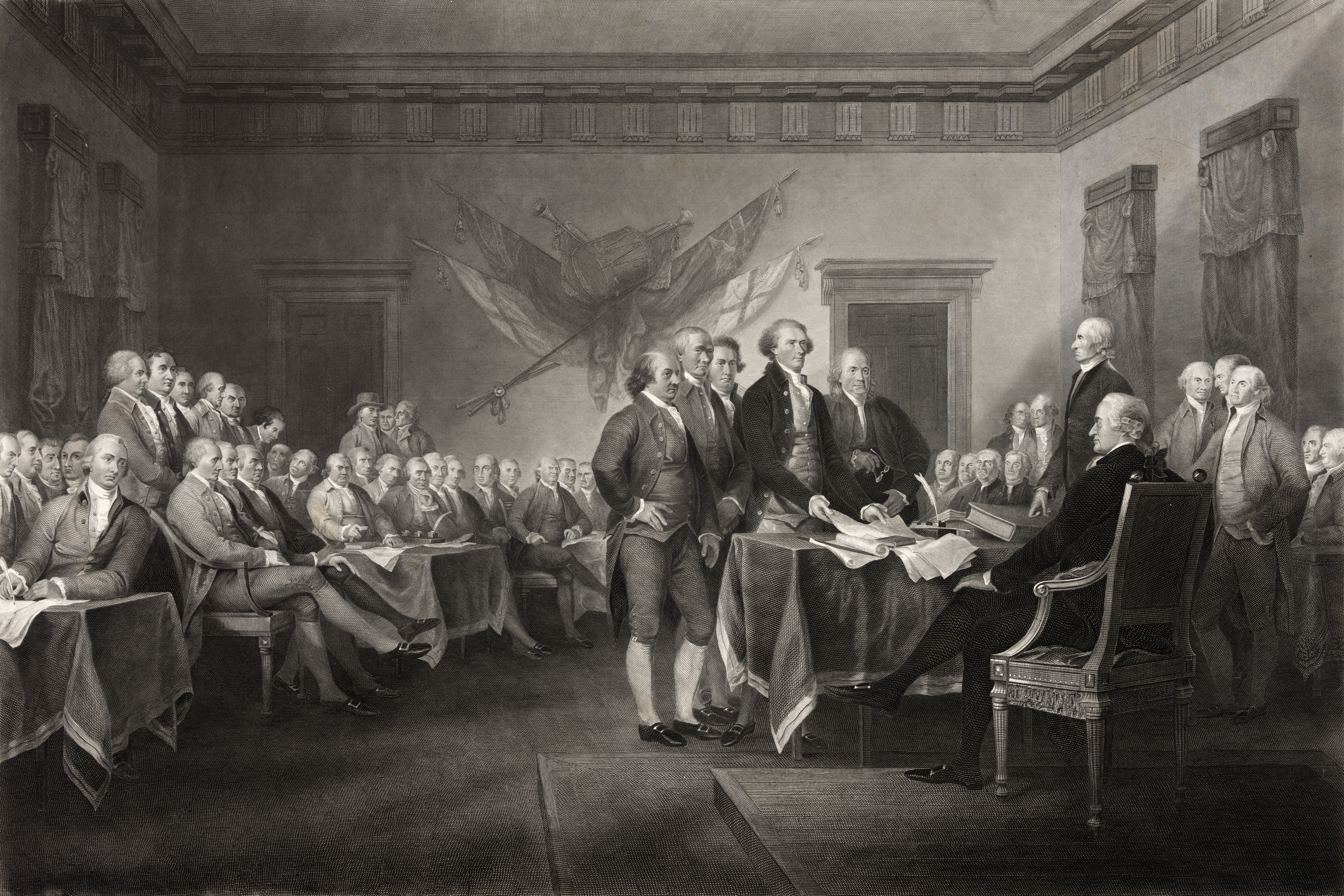Not all nationalisms are created equal.
American Conservatism First

Nationalism in the abstract can’t defend our unique constitutional traditions.
Charles Kesler’s essay “National Conservatism vs. American Conservatism” asks a crucial question that has been a theme of his work for some time: Where is America in your conservatism? This is the key question for anyone who would preserve the American constitutional order in the face of progressivism’s seemingly never-ending, always mutating onslaught against our limited framework of government.
The idea of “National Conservativism,” simply stated, is imprecise but practical. As the French political theorist Pierre Manent frames it, we should cultivate a humane national loyalty as a core component of a healthy political existence. Our dislocated and anxious intellectuals, on the other hand, exhibit near-uniform levels of oikophobia, unable to summon any love for their home country unless it accedes to their abstracted egalitarian demands. Manent contrasts humane national loyalty with an unyielding nationalism that makes the nation the source of supreme loyalty and existential value—one that can marginalize other nations as lesser political orders. But what exactly completes the picture of a good nation or a bad nation? Are certain types of regime inherently better or worse than others, or is it only a matter of execution? What in a nation’s tradition should be kept or discarded? What does it mean to love one’s country? And on what principles?
In this new essay, Kesler makes our constitutional republic the anchor of his opposition to National Conservatism, and his guide for answering the various questions it raises. However, in stating his opposition, Kesler also notes that he understands the embattled condition of the nation, attacked from both sides as transnational institutions seek to devour its sovereign integrity and identity politics types seek to undermine its citizenship and individual rights. He understands why so many thoughtful people decided to sign the National Conservatism Statement of Principles (SoP). This is a wise note, one that I concur with in full. The essay bears close study, however, for its exploration of the reasons why Kesler says that he “did not sign” the National Conservatism SoP, “which was not so much because of what it said but because of a certain unease over what it did not say.”
Kesler first touches on the rather standard critique of “Fusionism” and Reagan/Buckley conservatism as libertarian and morally unfocused, permitting the Left to rack up victories in every sphere other than economics. This is to ignore rather obvious battles during conservatism’s full postwar period “over McCarthyism, anti-Communism, and internal security, and against the legal shortcomings and unrestrained moralism of the civil rights revolution.” Kesler might have added that the pro-life movement also began quickly after the Roe decision in 1973 and achieved its biggest success in the Dobbs case in 2022. Some things take time.
Similarly, color-blind principles, which were articulated by the conservative movement and the Claremont Institute during this timeframe of supposed conservative sleepwalking, recently received their due in the Harvard and UNC affirmative action case of 2023. The principles in the majority opinion form the core opposition to wokeness and Critical Race Theory in subsequent suits that are now being filed in federal courts alleging violations of the Equal Protection Clause and/or the Civil Rights Act. Likewise, Kesler rightly includes the issue of unrestrained government, which Libertarians were very political about addressing. Their efforts are now sideswiped by “Our contemporary New Right who sometimes” say that government overreach isn’t a matter of worry anymore, “because the problems of wokeness are so much more urgent and oppressive.” But this ignores the fact that these issues haven’t gone away and will return with even greater vehemence if they are left to fester without any public opposition.
Not Just Any Nation
The crux of the essay focuses on how National Conservatism seeks to nationalize American conservatism “along Anglo-American or some other reconstructed or abstract lines.” Kesler notes what should be obvious here:
The principles of our nationalism derive from the founding documents of the republic. For Americans, as the Declaration and countless other public affirmations make clear, the nation itself is or conceives itself to be the result of a choice by individuals, enjoying certain inherent and unalienable rights, to join together as a people for their mutual safety and happiness, and to form a government for themselves to secure those rights and effect those ends.
In referring to the National Conservatism SoP’s “Overview,” Kesler observes that it poses the following “self-referential” question: “Is the new American and British nationalism a hostile usurper that has arrived on the scene to displace political conservatism? Or is nationalism an essential, if neglected, part of the Anglo-American conservative tradition at its best?” What, Kesler inquires, does it even mean to speak of an “American and British nationalism” in the singular rather than plural? Are we really the same?
Not helping matters is that the nationalism of the Natcons might not actually be defined by a humane national loyalty, or, as Kesler phrases it, “a preference for one’s own nation,” so much as by an attachment of some kind to “the idea of a nation.” What Kesler uncovers is the nominalist philosophy behind the Natcon project, making much of what it declares conclusory without adequate explanation or a principled defense. For example, the SoP holds that “We emphasize the idea of the nation because we see a world of independent nations—each pursuing its own national interests and upholding national traditions that are its own” against “universalist ideologies” that would destroy nations. But this is the Natcons’ own ideological conception of what good nations are, Kesler observes, and it ignores that nations can also be bad actors in pursuing their interests. How do we know the difference?
The SoP says that proper nationalism is anti-imperialist, which would exclude China, Russia, and others, as well as practitioners of liberal imperialism. But what if imperialism is part of your national tradition? British nationalism, anyone? Russian nationalism? Is the case of Ukraine’s defense a matter of “liberal imperialism,” with NATO encroaching on Russian interests? Is Russia’s invasion an example of imperialism, or its tradition of nationalism? We don’t get principles to decide these questions for the SoP.
The only real standard would seem to come from the moral minimum of the Ten Commandments, which Yoram Hazony’s The Virtue of Nationalism (2018) employs as the independent judge of national conduct and law. Hazony and the SoP are no friends of natural law, or what he calls “conservative rationalism,” which Hazony claims endorsed the methods of “enlightenment rationalism.” This is taken by many to have guaranteed Western failure. However, Kesler notes that Aquinas included the second half of the decalogue as part of the natural law. Moreover, can we not distinguish between the closed circle of “rationalist” thought and the use of practical reason to inform thought and action?
But the SoP refrains from mentioning natural law or the Decalogue. So how much stock do the Natcons put in the moral minimum? Or is it the case that national “traditions” somehow include the meaning of everything? Such a definition of nationalism would mean ignoring an American “civic or republican nationalism,” a “nationalism limited and shaped by human equality, liberty, and consent.” This generic nationalism is, Kesler states, “a re-writing of American conservatism,” making it like the nationalism of everyone else. Should that bargain be accepted by conservatives in America?
Kesler rightly emphasizes that the United States understands itself to be a founded nation, one that constituted itself by the capstone achievements of the Declaration of Independence and the United States Constitution. As Donald Lutz underscores in his wonderful study The Origins of American Constitutionalism (1988), Americans are first and foremost a constitutional people, where the free and equal individual is the principle of the founded order, along with a host of architectonic principles: a written constitutional document, enumerated powers, federalism, separation of powers, checks and balances, separate voting constituencies for different branches, deliberation and delay in law-making, among others. Prior to the Constitution of 1787, the Articles of Confederation, and the Declaration of Independence, the colonists had established nearly 150 years of self-governing habits in representative assemblies under a variety of written charters, compacts, and codes. This period represents the colonists building in their separate colonies the law-abiding notions that will come to define them as a constitutional people.
When they finally did unite under the pressure of declaring independence from Great Britain and its hostile intentions, they claimed written constitutionalism as their birthright. Most colonies after 1776 wrote new state constitutions whose imprint would be discernible on the new Constitution in 1787. The salient fact is not the difficulties and disagreements that were involved in joining together under one Constitution, but that it could be achieved at all, via deliberation by representatives in a constitutional convention and state legislature appointed ratification assemblies. This is American constitutionalism, and American conservatism at its best must always uphold it.
Kesler concludes that the SoP asserts a nationalism different from that “advanced in the Declaration of Independence, the Constitution, and The Federalist.” Indeed, “the Natcons risk supplanting Americans’ actual political inheritance with a faux inheritance, all in the name of tradition.” With this elegant and firm essay, Charles Kesler has recruited our logic and sentiments to unite in support of American constitutional nationalism, the tradition you can believe in.
The American Mind presents a range of perspectives. Views are writers’ own and do not necessarily represent those of The Claremont Institute.
The American Mind is a publication of the Claremont Institute, a non-profit 501(c)(3) organization, dedicated to restoring the principles of the American Founding to their rightful, preeminent authority in our national life. Interested in supporting our work? Gifts to the Claremont Institute are tax-deductible.
There’s no escaping the tensions inherent in National Conservatism, and in political life.
At the intersection of politics and principle.



